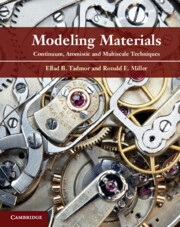Book contents
- Frontmatter
- Contents
- Preface
- Acknowledgments
- Notation
- 1 Introduction
- Part I Continuum mechanics and thermodynamics
- Part II Atomistics
- Part III Atomistic foundations of continuum concepts
- 7 Classical equilibrium statistical mechanics
- 8 Microscopic expressions for continuum fields
- 9 Molecular dynamics
- Part IV Multiscale methods
- Appendix A Mathematical representation of interatomic potentials
- References
- Index
8 - Microscopic expressions for continuum fields
from Part III - Atomistic foundations of continuum concepts
Published online by Cambridge University Press: 05 June 2012
- Frontmatter
- Contents
- Preface
- Acknowledgments
- Notation
- 1 Introduction
- Part I Continuum mechanics and thermodynamics
- Part II Atomistics
- Part III Atomistic foundations of continuum concepts
- 7 Classical equilibrium statistical mechanics
- 8 Microscopic expressions for continuum fields
- 9 Molecular dynamics
- Part IV Multiscale methods
- Appendix A Mathematical representation of interatomic potentials
- References
- Index
Summary
The governing equations of continuum mechanics and thermodynamics were derived in Chapter 2 based on the fundamental laws of physics and the assumption of local thermodynamic equilibrium. These equations, summarized at the start of Section 2.5, provide relationships between a number of different continuum fields: density ρ(x), velocity v(x), Cauchy stress σ(x), heat flux q(x), temperature T(x), entropy s(x), and the internal energy density u(x). In the continuum worldview these entities are primitive quantities that emerge as part of the framework of the theory. When solving a continuum problem it is not necessary to know “what” they are as long as experiments can be devised to measure the constitutive relations that connect them. This view of continuum mechanics was strongly held by its early developers as evidenced by the quote in footnote 17 on page 43.
The objective of this chapter is to go beyond the phenomenological approach of classical continuum mechanics and thermodynamics by establishing a direct connection with the underlying atomistic system. Our motivation for doing so is not to prove that the continuum theories are correct (there is ample proof for this by their success), but rather to provide a mechanism for computing continuum measures in molecular simulations. This is important in order to be able to extract constitutive relations from “computer experiments” and to help rationalize the results of such simulations in the language of continuum mechanics.
Information
- Type
- Chapter
- Information
- Modeling MaterialsContinuum, Atomistic and Multiscale Techniques, pp. 440 - 491Publisher: Cambridge University PressPrint publication year: 2011
